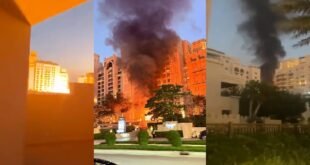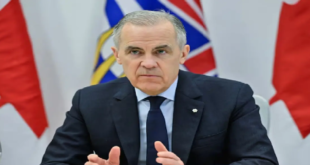19-11-2022
NGARANNAM- NIGERI: Saleh Abba’s new home, a well-ventilated two-bedroom flat that he shares with his wife and three children in Ngarannam, a small, humid town in the northeast Nigerian state of Borno, is a source of joy for the Boko Haram survivor.
 The 29-year-old grain grinder’s favourite spot is the zaure, a waiting room that leads visitors into a large courtyard, where he plans to rear cattle and regain the fortunes he lost seven years ago.
The 29-year-old grain grinder’s favourite spot is the zaure, a waiting room that leads visitors into a large courtyard, where he plans to rear cattle and regain the fortunes he lost seven years ago.
One night in 2015, Boko Haram invaded Ngarannam just as Abba finished his dinner. Members of the armed group wounded and killed dozens of people, he said. A six-bedroom apartment on his family’s ancestral land was destroyed by a bomb, like dozens of other houses in the community.
That led to a journey of homelessness for the Abba family who walked barefoot through bushes for three nights until they arrived in Maiduguri, the birthplace of Boko Haram and capital of Borno.
Over the next seven years, they moved across three camps for internally displaced people (IDPs) in Maiduguri, dependent on aid for survival. “(It was) the worst period of my life,” Abba told Al Jazeera. “I lost my home, livelihood and freedom.”
Since 2009, Boko Haram has killed tens of thousands of people and displaced millions in northeast Nigeria, creating one of the world’s worst humanitarian crises.
In 2022 alone, about 5.5 million people have been displaced across Borno, Adamawa and Yobe, the three states most affected by the crisis, according to the United Nations Office for the Coordination of Humanitarian Affairs (OCHA).
 Last year, the Borno government unexpectedly announced the closure of IDP camps, especially in Maiduguri, and began sending people back to their home towns as part of a stabilisation programme. So far, this has affected more than 200,000 IDPs.
Last year, the Borno government unexpectedly announced the closure of IDP camps, especially in Maiduguri, and began sending people back to their home towns as part of a stabilisation programme. So far, this has affected more than 200,000 IDPs.
“Stabilisation provides security,” Borno governor Babagana Zulum told Al Jazeera. “The first component of stabilisation is to provide security, then infrastructure and livelihood all these three components are geared to addressing the root causes of the insurgency which are not limited to illiteracy, poverty and infrastructure deficit.”
‘A dream come true’
The UN Development Programme (UNDP), in partnership with the Nigerian government at state and federal levels, is now looking to resettle IDPs across northern Nigeria and the Lake Chad region.
Launched in September 2019, the pilot project is supported by the European Union and several other partners, including the governments of Borno, Adamawa and Yobe.
The willingness of the government to play a pivotal role in the project has been important, the UNDP’s resident representative for Nigeria, Mohamed Yahya, told Al Jazeera. “It can’t be the UN leading because the overall goal is to build social contracts between the people and the government so that people don’t sympathise with the insurgents,” he said.
 The initial focus is on nine communities.
The initial focus is on nine communities.
Abba’s community, Ngarannam, abandoned in 2015 after the Boko Harm raid, is among them. Construction started in 2020 and the first phase finished in 2022. In October, people began to return. The second phase is expected to be completed in 2024.
The project’s first phase comprises 360 two-bedroom houses equipped with energy-efficient stoves and a bathroom and toilet. There is a police outpost and residential quarters, primary school and teachers’ accommodation, a dispensary, market, a social area, and a water tower for a solar-powered bore.
The homes are expected to shelter 2,160 people. In the second phase, there will be an additional 140 houses, 500 in total.
Officials say the project is a unique architectural design inspired by the culture and considerate of the climate, the Sahel Savanna of the area. Nigerian architect Tosin Oshinowo, who designed the whole project, said she consulted the community on their preferred house designs.
“It (the project) has captured what we normally call public participation,” said Phanuel Joshua, a senior lecturer in urban and regional planning at the University of Maiduguri. “The design has a fusion of the Kanuri and  Fulani/Hausa cultures, and it has taken care of some planning and housing requirements that would be used in building subsequent housing projects.”
Fulani/Hausa cultures, and it has taken care of some planning and housing requirements that would be used in building subsequent housing projects.”
“We thought [rebuilding] wouldn’t happen until we saw the design presented to us,” Bulama Aji, the community’s chief, told Al Jazeera. “Seeing the reconstruction of Ngarannam from the ground up is like a dream come true.”
In October, there was a launch ceremony for the rebuilt community of Ngarannam. Hundreds of people were present, including the governor, representatives of the federal government and the EU.
Abba, along with 100 other beneficiaries, left with keys to the new family home when the ceremony ended. They also received a starter pack which included two 50kg bags of corn, 50kg bags of rice, one gallon (3.7 litres) of vegetable oil, one plastic mat and blanket, one set of clothing materials and 100,000 Nigerian naira ($228) cash each, to rebuild their lives.
“I am grateful,” Abba said. “I didn’t expect they would build the house from Maiduguri to Mafa, there are other villages (affected by the armed rebellion), but they chose our community.”
But some experts and civil society groups working in the region say the project, though well-intentioned, is premature, considering the prevalent insecurity in the area.
According to a recent report by Human Rights Watch, the state’s action may not be borne out of goodwill for the IDPs, but linked to the actualization of Borno’s 25-year development framework and 10-year strategic transformation plan, rather than altruism for the IDPs.
Governor Zulum, while announcing the plan in 2020, said the program would “drive stabilisation, boost recovery efforts and stimulate growth across all sectors in the state”.
“The development agenda that government has is a good idea,” said Anietie Ewang, Nigeria researcher at Human Rights Watch “but in the grand scheme of things, a lot of people are collateral damage.
“This agenda to get people off humanitarian aid (now) is also ill-advised. Deprivation of food (aid) within the context of conflicts is a violation of rights of IDPs,” she added.
Per the HRW report, more than 200,000 people have been affected since the closure of the Maiduguri camps. Ewang told Al Jazeera that only a quarter of that number would eventually be part of projects like Ngarannam.
 There are also security risks. Nigerian military interventions have neutralized armed rebel activity in Borno lately and there is relative peace in Maiduguri but there have been intermittent attacks on remote villages in the region.
There are also security risks. Nigerian military interventions have neutralized armed rebel activity in Borno lately and there is relative peace in Maiduguri but there have been intermittent attacks on remote villages in the region.
As recently as May 2022, non-state actors killed 50 people in Rann, a Borno village. Residents blamed the attack on Boko Haram.
Back in Ngarannam, Abba is unbothered about these complications, at least for now. He is overwhelmed with gratitude and happiness, and looking forward to the next stage of his life.
A large portrait of him adorns the entrance to his new home, and he has taken to smiling while entertaining well-wishers in his zaure. “I love this house, and I look forward to living here, building my business here, for many years to come,” he told reporter. (Al Jazeera)
 Pressmediaofindia
Pressmediaofindia





